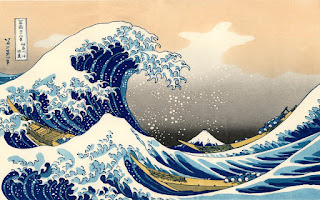"We couldn't fail to turn when we heard it brutally roaring...." Creative writing based on Hokusai's The Great Wave
The Great Wave - Creative writing workshop, Year 6
Week 2: Drafting a narrative
After our previous work on vocabulary, this week's workshop was a chance for the children to put their rich language and ideas into action.
 |
| A first draft of writing based on The Great Wave (Hokusai) - Year 6 boy, Leeds primary school |
A good author needs a strong command of language. This writing, although excellent, didn't just happen! It was built upon the foundations of creative thought, a rich bank of vocabulary and the experience of applying it in sentences.
These were key parts of the process:
- Children read a model text to see how a piece is structured. We used this to make a plan for our own writing.
- We tried to retain a sense of mystery and suspense by not naming the wave, simply referring to 'it'. We thought about scary movies we had seen and how people behave when the big-bad appears unexpectedly.
- The sentences we practised last week formed the spine of each paragraph drawing in simile, adjectives and adverbs as well as personification.
- To give the writing an authentic feel, we included references to Shinto deities and the Japanese names for animals (including the symbols - they were great fun to draw!)

